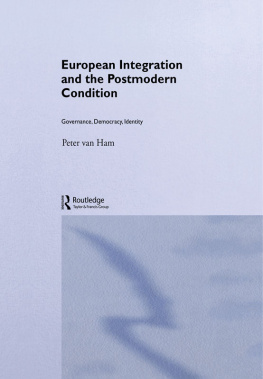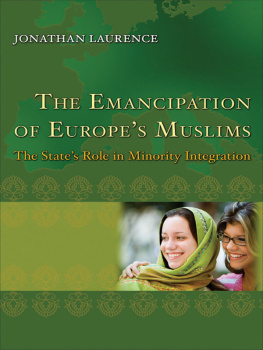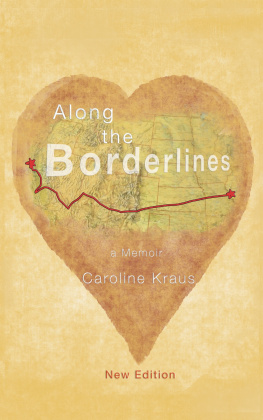Peter A. Kraus, Peter Kivisto
The Challenge
of Minority
Integration
Politics and Policies in the Nordic Nations
Managing Editor: Andrea Dauber
Associate Editor: Pablo Markin
Published by De Gruyter Open Ltd, Warsaw/Berlin
Part of Walter de Gruyter GmbH, Berlin/Boston
The book is published with open access at www.degruyter.com.
This work is licensed under the Creative Commons Attribution-NonCommercial-NoDerivs 3.0 license, which means that the text may be used for non-commercial purposes, provided credit is given to the author. For details go to http://creativecommons.org/licenses/by-nc-nd/3.0/.
Copyright 2015 Peter A. Kraus, Peter Kivisto
ISBN: 978-3-11-044110-9
e-ISBN: 978-3-11-044111-6
Bibliographic information published by the Deutsche Nationalbibliothek
The Deutsche Nationalbibliothek lists this publication in the Deutsche Nationalbibliografie; detailed bibliographic data are available in the Internet at http://dnb.dnb.de.
Managing Editor: Andrea Dauber
Associate Editor: Pablo Markin
www.degruyteropen.com
Acknowledgements
The chapters in this collection are the final results of a conference that was held in Helsinki in October of 2009, hosted by Peter Kraus. The participants were part of a research project titled Challenging Power, which represented one of twenty-one discrete programs funded by the Academy of Finland in the Valta (Power) Program, the first effort in several decades to explore the topic of power in Finland from a number of methodological and disciplinary perspectives, and with a view of power that was more encompassing than traditional studies of the parliamentary and electoral system. This particular project sought to look in depth at issues related to power and the inclusion of minority groups in Finland, which included both old minority groups such as the Smi and the Roma and new immigrant groups. We would like to recognise a number of individuals for their contributions to the success of the project, in addition to the authors included herein. We appreciate the support of the staff at the Academy of Finland, in particular Petteri Pietikinen for going beyond the call of duty in assisting us. We would also like to thank the following individuals at the Centre for the Study of Ethnicity and Nationalism at the University of Helsinki: Daniel Moran, Tom Sandlund, Pasi Saukkonen, Matti Simil, and sten Wahlbeck.
Thomas Hylland Eriksen
1 The Meaning of We
Some words typically used to characterise our present age Western or non-Western are flux, mobility, identity politics and multiculturalism, hybridity and the ongoing contestation of social and cultural boundaries. Issues taken on in the present volume include minority rights, citizenship, the dilemmas of multiculturalism in liberal societies, the often fraught relationship between state and civil society, and questions to do with the identity of the demos of a democracy. From this cluster of contentious and intellectually challenging questions I take my cue, and will use this opportunity to reflect on possible meanings of the word we in the contemporary world.
The word we is situational in that it can refer to a variety of collectivities depending on the context. It implies both inclusion and exclusion: by logical extension, the word we implies they. Of particular interest is the question why certain ways of delineating a collective identity become empirically predominant while others are forgotten. This is not an issue of mere academic interest in a world which witnesses the upsurge of ethnic, religious and national identities sometimes from below, in opposition to the state, sometimes from above, in defence of the state while other forms of identification (based on, say, place or class) tend to be less visible. Regarding the contemporary state, the issue at hand concerns who is to be included in the state, and what it entails to be included.
In the following, I shall approach the question of we from three perspectives. First, I simply ask what a society is. Secondly, I consider some kinds of dominant relationships that may lead to exclusion within a given society. Thirdly and finally, I distinguish between different forms of integration. As a result, it may be possible to explore questions of societal boundaries and collective identities slightly more accurately in the future.
1.1 What is a society?
What is a society? asks the anthropologist Maurice Godelier (2009:137) in a book that discusses Melanesian village societies and modern state societies in a comparative spirit. The question has been raised many times before. It is, in fact, much older than social science. In our era, this simple, but complex question has developed new meanings, and perhaps a more acute character than usual in human society. Rapid processes of change and enhanced mobility have made the boundaries of societies and their content less obviously clear than before.
When the classic sociologists, from Tnnies and Durkheim to Simmel and Weber, discussed the nature of society, they wrote against a backdrop of dramatic social transformations, that is the shift from agrarian to industrial society. In the decades around the last turn of the century, frantic industrialisation and urbanisation took place around Europe and North America, closely interconnected with the consolidation of colonial empires in Africa, Asia and the Pacific. Formerly autonomous tribal societies were incorporated into colonial empires, at the same times as millions of Europeans moved from rural areas to towns. During the 19th century, the industrial capitalist took over from the feudal landowner as the engine of economic processes. International migration was widespread then as now, but the main currents went from countries in the north to European settler colonies such as Canada, South Africa and New Zealand. Actually, a significantly higher proportion of the worlds population lived outside their country of birth in 1911 than in 2011 (Castles and Miller 2003), although absolute numbers were lower. In 1911, the total population of the planet was 1.7 billion; it has been quadrupled in a hundred years, in other words.
Like most social scientists in our century, Godelier writes against a backdrop of globalisation processes, but his vantage point is not the Northern metropoles. Instead, he takes his point of departure in his own long-term research among the Baruya, a people in the New Guinea highlands who number roughly two thousand individuals. Before the Australian-British colonisation of Papua New Guinea reached the lands of the Baruya in 1960, they doubtless constituted a society, according to Godelier. They were an autonomous group, which stood in contact with other autonomous peoples (with whom they traded salt and other goods), but who were themselves in charge of their social, cultural and ritual institutions. Following the Australian and later Papuan incorporation of Baruya territory into a state formation, it is increasingly debatable whether the concept society is appropriate for them. For a society is not merely an aggregate of persons with certain formal traits in common (e.g. language or religion), or simply a state or otherwise delineated territory. More is required for the term society to fit. Godelier formulates his question like this:









